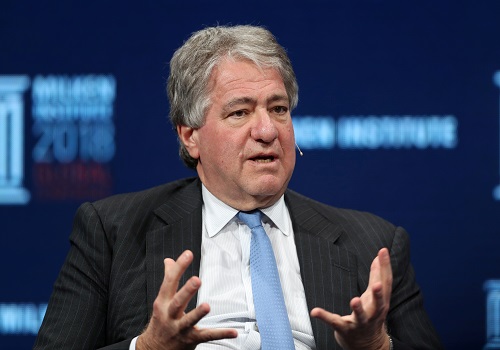Leon Black step downs as Apollo CEO after review of Epstein ties

Follow us Now on Telegram ! Get daily 10 - 12 important updates on Business, Finance and Investment. Join our Telegram Channel
NEW YORK - Leon Black said on Monday he would step down as chief executive at Apollo Global Management Inc, following an independent review of his ties to the late financier and convicted sex offender Jeffrey Epstein.
While Black, whose net worth is pegged by Forbes at $8.2 billion, will remain Apollo's chairman, his decision to step down illustrates how doing business with Epstein weighed on the reputation of one of Wall Street's most prominent investment firms. Black co-founded Apollo 31 years ago.
Apollo said it plans to change its corporate governance structure, doing away with shares with special voting rights that currently give Black and other co-founders effective control of the firm.
The independent review, conducted by law firm Dechert LLP, found Black was not involved in any way with Epstein's criminal activities. Black paid Epstein $158 million for advice on tax and estate planning and related services between 2012 and 2017, according to the review.
Black, 69, said that although the review confirmed he did not engage in any wrongdoing, he "deeply" regretted his involvement with Epstein.
"I hope that the results of the review, and related enhancements ... will reaffirm to you that Apollo is dedicated to the highest levels of transparency and governance," Black wrote in a note to Apollo fund investors. He will step down as CEO no later than July 31.
Apollo co-founder Marc Rowan, 58, will take over as CEO.
Rowan has often kept a low-key profile compared with Apollo's other co-founder, Joshua Harris, 56, and spearheaded many initiatives that turned Apollo into a credit investment giant, including the permanent capital base the firm enjoys through its ties to reinsurer Athene Holding Ltd.
The revelations of Black's ties to Epstein took a toll on Apollo, which Black turned into one of the world's largest private equity groups. Apollo executives had warned in October that some investors had paused their commitments to the buyout firm's funds as they awaited the review's findings.
Apollo shares are down 1% since the New York Times reported on Oct. 12 that Black paid at least $50 million to Epstein for advice and services, when most of his clients had deserted him.
Over the same period, shares of peers Blackstone Group Inc, KKR & Co Inc and Carlyle Group Inc are up 19%, 10% and 23%, respectively.
"We think a large number of (Apollo fund investors) took a 'pause', and we believe the outcome (of the review) and changes today will cause most of them to return to allocating to future Apollo funds," Credit Suisse analysts wrote in a research note.
Apollo shares jumped 4% to $47.65 in after-hours trading on Monday.
"We continue to follow these events closely and will evaluate how Apollo addresses its issues," the California State Teachers' Retirement System, one of the largest U.S. public pension funds and an Apollo investor, said in a statement.
Epstein was found dead at age 66 in August 2019 in a Manhattan jail, while awaiting trial on sex trafficking charges for allegedly abusing dozens of underage girls in Manhattan and Florida from 2002 to 2005. New York City's chief medical examiner ruled that the cause of death was suicide by hanging.
FALLING OUT
Black previously said he had paid millions of dollars to Epstein, but the exact size of his payments was revealed for the first time on Monday. Beyond the $158 million in payments, Black made two loans to Epstein totaling $30.5 million in early 2017.
Dechert said in its report that Black's social ties with Epstein, who built his fortune by endearing himself to powerful figures in high society, went back to the mid-1990s.
Epstein won Black's trust by resolving an estate tax issue for him in 2012 potentially worth at least $500 million, the report said. He ended up advising Black on various aspects of his personal financial affairs, from his family office and airplane to his yacht and artwork.
Black believed that Epstein provided advice over the years that conferred between $1 billion and $2 billion in value to him, according to the Dechert report. Black said in his note to investors that he had paid Epstein a fee equivalent to 5% of the value he generated on an after-tax basis, and not tied to hourly rates.
Black and Epstein's relationship deteriorated after Epstein failed to repay $20 million of the loans and Black refused to pay tens of millions of dollars in fees that Epstein demanded, according to the Dechert report.
They severed ties in October 2018, according to the report. Black knew Epstein had been convicted in Florida a decade earlier for soliciting prostitution from a minor, the Dechert report said, but there was no evidence suggesting Black had knowledge of the other alleged crimes before they were publicly reported in late 2018, culminating in Epstein's July 2019 arrest.
On Monday, Black pledged $200 million toward "initiatives that seek to achieve gender equality and protect and empower women," as well as helping survivors of domestic violence, sexual assault and human trafficking.
Apollo said it would pursue a "one share, one vote" corporate governance structure that would do away with shares with special voting rights. It said the move could qualify it for listing on the S&P Global indices.
Apollo also said it would seek to give its board more authority to oversee its business, eroding the power of its executive committee led by Black.
The board will be expanded to include four new independent directors, including Avid Partners founder Pamela Joyner and physician and scientist Siddhartha Mukherjee, Apollo said. Apollo co-Presidents Scott Kleinman and James Zelter will join the board and take on increased responsibility running day-to-day operations.












 320-x-100_uti_gold.jpg" alt="Advertisement">
320-x-100_uti_gold.jpg" alt="Advertisement">









